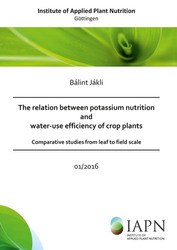| Fachbereiche | |
|---|---|
| Buchreihen (97) |
1384
|
| Nachhaltigkeit |
3
|
| Gesundheitswesen |
1
|
| Geisteswissenschaften |
2379
|
| Naturwissenschaften |
5410
|
| Mathematik | 228 |
| Informatik | 320 |
| Physik | 980 |
| Chemie | 1366 |
| Geowissenschaften | 131 |
| Humanmedizin | 243 |
| Zahn-, Mund- und Kieferheilkunde | 10 |
| Veterinärmedizin | 108 |
| Pharmazie | 147 |
| Biologie | 835 |
| Biochemie, Molekularbiologie, Gentechnologie | 121 |
| Biophysik | 25 |
| Ernährungs- und Haushaltswissenschaften | 45 |
| Land- und Agrarwissenschaften | 1005 |
| Forstwissenschaften | 201 |
| Gartenbauwissenschaft | 20 |
| Umweltforschung, Ökologie und Landespflege | 148 |
| Ingenieurwissenschaften |
1800
|
| Allgemein |
98
|
|
Leitlinien Unfallchirurgie
5. Auflage bestellen |
|
Erweiterte Suche
The relation between potassium nutrition and water-use efficiency of crop plants (Band 1)
Comparative studies from leaf to field scale
Bálint Jákli (Autor)Vorschau
Inhaltsverzeichnis, PDF (26 KB)
Leseprobe, PDF (100 KB)
The world’s population presently experiences a period of unprecedented growth, increasing the need to further intensify the agricultural production (Garnett et al.2013). At the same time, recent climate trends and model predictions suggest shifting temperature, precipitation and circulation patterns on global and regional scales (Shepherd 2014). In this context, the risk of temporal or unseasonal drought is increasing in many regions worldwide (Pachauri et al. 2014). Agriculture accounts for about 75 % of human water use (Wallace 2000). However, the availability of water is
the most limiting abiotic factor for plant production (Boyer 1996). Therefore, agricultural production and food security are highly susceptible to increased incidences of drought. Improving the water-use efficiency (WUE) of crop plants and cropping systems is therefore an important strategy to face the current challenges of
global change (Pinstrup-Andersen et al. 1999).
| ISBN-13 (Printausgabe) | 9783736994300 |
| ISBN-13 (E-Book) | 9783736984301 |
| Buchendformat | A5 |
| Sprache | Englisch |
| Seitenanzahl | 156 |
| Umschlagkaschierung | matt |
| Auflage | 1. Aufl. |
| Buchreihe | Institute of Applied Plant Nutrition - Göttingen |
| Band | 1 |
| Erscheinungsort | Göttingen |
| Promotionsort | Göttingen |
| Erscheinungsdatum | 12.12.2016 |
| Allgemeine Einordnung | Dissertation |
| Fachbereiche |
Land- und Agrarwissenschaften
|
| Schlagwörter | water use efficiency, plant nutrition, potassium, leaf gas exchange, stomatal control, mesophyll conductance, photosynthesis |








